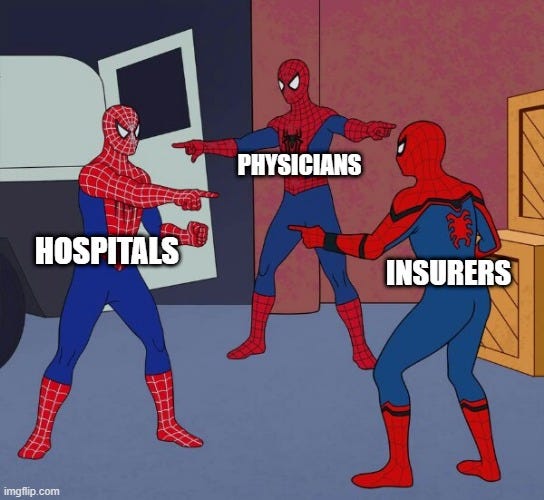So I've been listening to a lot of health economists go on national media outlets telling the public to not be so angry at private health insurers. They rightly point out that it is providers (e.g. private and non-profit hospitals, physicians’ business groups) who have market power and that the private insurers are the price-takers in this situation. The implication is that private insurers have low margins and must squeeze somewhere (i.e. patients).
I think that simple story is missing a huge opportunity to educate the American public about why healthcare in America is so expensive and eating into their incomes (and probably their health too if you buy the Case and Deaton “deaths of despair” story).
When excess healthcare spending is broached by the parties involved, each tends to point the finger at the other.
Physicians point to hospitals who charge enormous mark-ups and set their own prices, but they ignore their own occupational closure and that they are the largest occupation in the top 1% of national income. Hospitals point to payers who pay them too little (public insurance) or take excessive mark-ups for administrative costs (private insurers), but they ignore their regional monopolies. Insurers point to device manufacturers and pharmaceutical companies who lobby and charge excessive prices, but they ignore their payments to shareholders and that without them we wouldn't have to pay for all the claim verifiers and other administrative salaries (“low margins” is just another way to cover for these salaries). They all point to regulators as the problem for not regulating the other party.
The truth is all players in the healthcare market extract rent from American workers and taxpayers. This is a stable market with effective institutions that allow every party involved to get a piece of the action.
UnitedHealthcare is just the steroided out version of this rent-extracting sector: it is a vertically integrated provider and payer. What that means is that one end of the business gets to set whatever price it wants (so charging a million dollars for something that might cost them 200 dollars) and the other end of that business gets to write off the million dollars.
It's one ownership structure, our anti-trust institutions ignore them, and it’s dangerous.
This is a real missed opportunity to educate the public on where this is all going. Providers are squeezing payers, payers are figuring out new ways to squeeze patients through claim denials (e.g. enter algorithms) and eventually those patients are going to complain to their employers’ HR departments. (This complaining is the proper way to interpret the public reaction to the assassination). HR departments of employers (who have historically ignored this whole problem) are eventually going to have to do something and that something is to seek out a cheaper alternative that doesn't do as many claim denials. The better alternative is Medicare. Troyen Brennan’s new book is excellent on this: playing out a future where private companies end up demanding the right to purchase Federal Medicare plans as hospital and physicians and private insurers drown in their own ponzi scheme.



